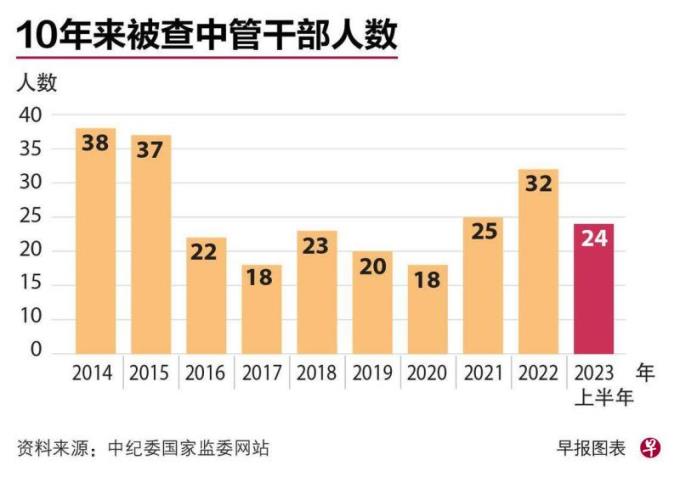
The Communist Party of China disciplinary inspection department will hit the "tiger" after the Dragon Boat Festival holiday, which has increased the number of middle management cadres who have been investigated this year to 24.The analysis predicts that with the official expansion of the field of anti -corruption and extending the time limit, the number of "tigers" that has been dismissed this year may write a 10 -year high.
The State Supervision Commission of the Communist Party of China on Sunday (June 25) reported that Xu Wenrong, the former deputy secretary and deputy general manager of China Petroleum and Natural Gas Group (PetroChina), was suspected of serious disciplinary violations and is currently undergoing disciplinary review and supervision and investigation.
At this point, 24 middle management cadres have been investigated this year, and the number of middle management cadres who fell in the whole year in 2021 was only less than 32 people in the whole year last year.If the "fighting tiger" in the second half of the year does not decrease, the central management cadres who have been investigated this year may exceed 38 people in 2014 and write the highest record in 10 years.
Central management cadres refer to cadres managed and appointed by the Central Committee of the Communist Party of China, mostly as senior officials at or above the ministerial level.The latest Xu Wenrong, 62 years old, has been in the oil industry for many years.He was the deputy general manager of PetroChina Group from 2016 to 2020.After from China Petroleum in October 2020, Xu Wenrong was also hired as a full -time external director of China -Emperors Group and China Building Materials Group and China Building Materials Group. It was removed from office in February this year.
Xu Wenrong's last public appearance was in the middle of the month. At the Second Council of the Sixth Council of the Petroleum Cultural Federation and 2023 working conference held by the 15th to 16th, he attended and spoke as the chairman of the Petroleum Cultural Federation.
Five days before Xu Wenrong's dismissal, the Central Committee of the Communist Party of China had just ended the two and a half month inspections of PetroChina.The analysis believes that Xu Wenrong was investigated for corruption during the time of PetroChina.
Among the central management cadres who have been investigated this year, nearly two -thirds have been dismissed after retirement or stepped down. The most typical is He Zehua, deputy director of the National Tobacco Monopoly Bureau, who had fallen off in January this year.He stepped down in March 2014, and was still reversed after retirement for nearly nine years.In addition, Li Dong, former deputy general manager of the National Energy Investment Group Co., Ltd., and Li Xiaopeng, the former chairman of China Everbright Group Co., Ltd., also settled down after the steps down.
Fifteen of the 24 horses are local officials, from 13 provinces and cities including Hebei, Shandong, Xinjiang, Hunan, and Chongqing. Two officials in Shandong and Chongqing have been investigated.As many as 12 of them are settled in "second -line positions" at the local people's congress or the CPPCC.
Tang Renwu, Dean of the Government Management Research Institute of Beijing Normal University, analyzed in an interview with Lianhe Morning Post that many of the above local members have retired from the second line and even retired."They did not expect to find themselves. But the trend of" fighting tigers "this year showed that as the anti -corruption case was deepened, retirement was no longer the" amulet "of officials."
Tang Renwu added. After the re -election of the Communist Party of China in October last year, the anti -corruption work developed in depth.In addition to tracing the timeline, the field of anti -corruption has also been further expanded. Du Zhaocai, the former deputy director of the State General Administration of Sports in the sports industry this year, this year, is one of the examples.
The Central Inspection Team entered the 30 central management enterprises, five financial units, and the State Sports General Administration of Sports in April this year. As of June 20, the inspection of each unit was completed.One day, the Central Commission for Discipline Inspection reported the news that nine state -owned state -owned state -owned state -owned enterprise managers were investigated, which increased the cadres of the central enterprise that had been checked this year to about 40 people.



